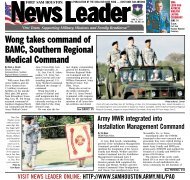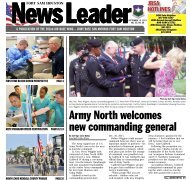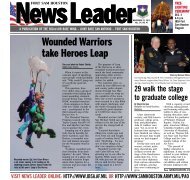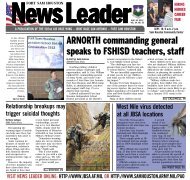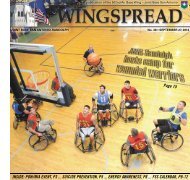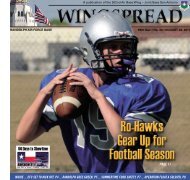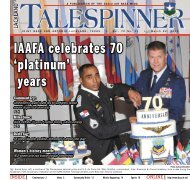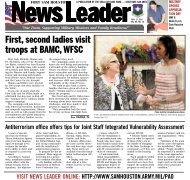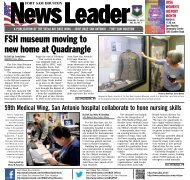from this edition - Fort Sam Houston - U.S. Army
from this edition - Fort Sam Houston - U.S. Army
from this edition - Fort Sam Houston - U.S. Army
- No tags were found...
Create successful ePaper yourself
Turn your PDF publications into a flip-book with our unique Google optimized e-Paper software.
PAGE 10 NEWS LEADER MAY 10, 2012Tips for controlling mosquitoesBy Master Sgt. Tiffany Oliver559th Public Health FlightDue to the amplerains that Texas hasexperienced <strong>this</strong> spring,the insect population isthriving, to include mosquitoes.Not only are mosquitoesannoying, butthey can also transmitdiseases to humans.Some diseases thatare transmitted bymosquitoes in Texas areCourtesy PhotoStaff Sgt. Daniel Rodriguez collects mosquitoes <strong>from</strong> a Mosquito LightTrap at Joint Base San Antonio-Lackland Air Force Base May 1. Thetraps are used to collect mosquitoes that are frozen and sent to the<strong>Army</strong> Public Health Command for identification and testing for possibleviruses. Rodriguez is a technician with the 559th Public Health Flight.West Nile Virus, Easternand Western EquineEncephalitis, St LouisEncephalitis and DengueFever.The number of reportedcases of mosquito-borneillnesses usuallypeaks at the end of thesummer as these virusesare amplified in the wildbird populations over thecourse of the summer.To minimize the annoyancefactor and therisk of disease transmission,Public Healthrecommends the followingsimple preventionmeasures:• Drain sources ofstanding water wheremosquitoes may breed,such as cans, tires, roofdrains, tree holes, puddlesbelow outdoor watertaps, saucers underflower pots, infrequentlyused hot tubs, etc.• Keep water fresh(change the water oftenso it does not stagnate)in pet bowls, birdbaths,and wading pools.• Make sure screens onwindows and doors arein good repair.• Dress in protectiveclothing (long-sleeveshirts and pants) whenoutside.• Limit outdoor activitiesbetween dusk and dawn.• When outside, useinsect repellent containingDEET or picaridin onuncovered skin.Additional informationon specific diseases canbe accessed at www.cdc.gov/ncidod/dvbid/arbor/arbdet.htmFor additional information,contact the559th Public HealthFlight at 671-9623/9625.JROTC CADETS VISIT FSHPhoto by Kathy SalazarHighlands High School <strong>Army</strong> JROTC Cadet Cpl. Anita Manjarrez stops to admire the PhilippineScouts Heritage of Valor display <strong>from</strong> 1902 through 1974 at the <strong>Fort</strong> <strong>Sam</strong> <strong>Houston</strong> Museum May3. The group of cadets visited Brenner and NCO Barracks, the Department of Combat Medicine,Engagement Skills Trainer and dined with service members during their tour of Joint Base SanAntonio-<strong>Fort</strong> <strong>Sam</strong> <strong>Houston</strong>.




